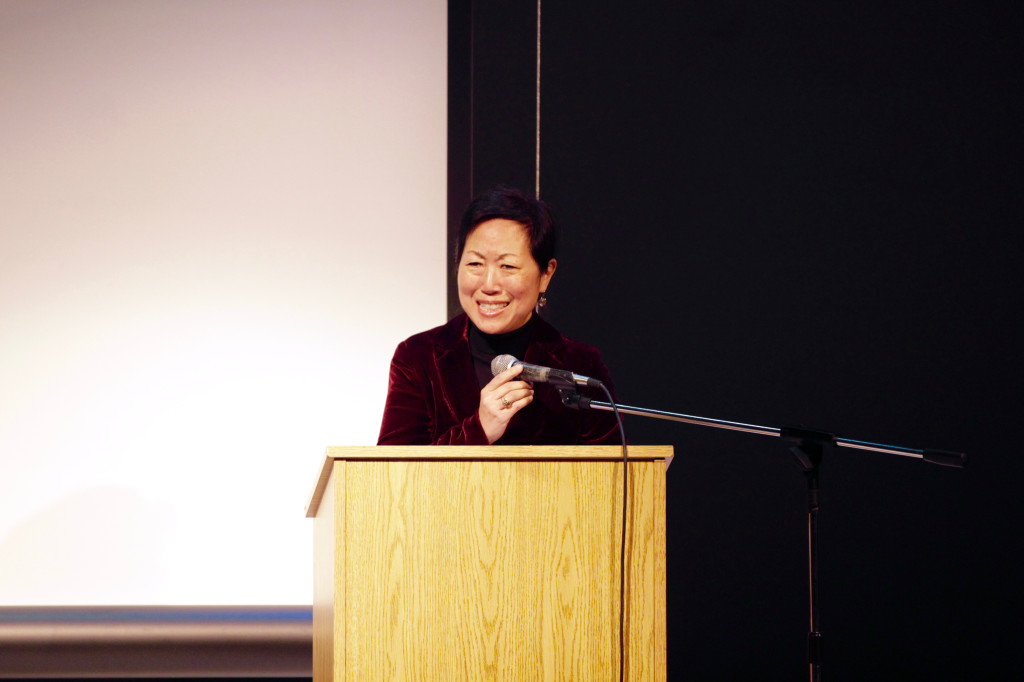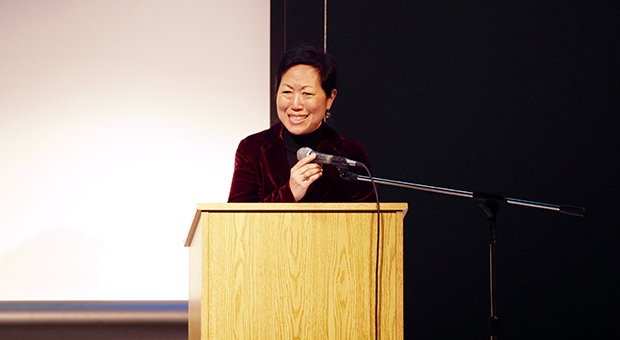
Photo by Gus Aronson.
On Dec. 3, Upper School students and faculty congregated in the auditorium to hear about the challenges and joys of being Asian-American.
The assembly, organized by Mia Bendy (VI), Davis Lai (VI), Alissa Mori (VI), Isabel Sung (VI) and sponsored by the A.S.I.A. Club, started with a pageant of two red dragons dancing to Justin Bieber’s “Sorry”. In typical Fieldston fashion, the assembly opened with Buzzfeed videos including, “Awkward Moments Only Asians Understand” and “Asians Respond to Racist Comments.” After evoking applause, laughter and attention, many students spoke about the stereotypes and double standards they experience as Asian-Americans.
Leora Shlasko (IV) spoke about how stereotypes don’t accurately define people. Shlasko addressed three stereotypes: all Asians love math, all Asians are adopted, and Filipinos in America are all babysitters. She shared how these stereotypes dehumanize Asians by characterizing people before those people have the chance to characterize themselves. Shlasko expressed the importance of understanding the danger of a single story, a theme introduced during Fieldston’s Nov. 12 Modified Awareness Day, and the importance of not jumping to conclusions based on race.
“I have the privilege of having two sides to my identity,” she said, referring to her biracial origins.
“The privilege of being Filipino and the privilege of being able to celebrate the Jewish, Italian, Russian and Polish cultures at the same time. But this same privilege reminds me that I have the disadvantage that a huge part of my identity is cast aside by people who don’t know me or who are crazy to jump to conclusions because of stereotypes.”
Dassa Phillipson (V) shared her experience as an adopted Asian-American and the importance of discussing her identity with people who share the same background.
“Being Asian and adopted is a blessing and a curse,” she said. “It’s amazing that I was able to be adopted and have this amazing life here in America. But it also means that I’m never truly going to fit in. However, I will always belong to one group: the group of adopted Asian-Americans.”
Davis Lai (VI) talked about the freedom that has arisen for him as a result of veering away from stereotypes, and how that liberation has played a role in discovering himself as a person and an Asian-American.
Farzana Islam (V) wrote a speech about being Bangladeshi. “For the longest time,” she said, “I didn’t even know I was Asian.” She said when thinking about Asians, our society only thinks about East Asians.
Keerti Gopal (V) shared that she felt “caught between two identities” as she grew up with Indian and American cultures. Eventually she learned that she didn’t have to claim just one identity but that she could,“be Indian and still be American.”
Other speakers addressed that different American stories don’t make you a lesser American, and how the absence of Asian-American history in the school curriculum has led to a gap in students’ educations.
The guest speaker, Jeannie Park, former executive editor of People Magazine, spoke about the lack of diversity in the media and most leadership positions. She said that our awareness of this issue can make a difference. She shared a story about publishing an article on Seung-Hui Cho, a South-Korean who murdered students at Virginia State University. Park made sure People put his name in the correct order, even though all other publications wrote his last name first. This moment stands out to Park as one of the most empowering experiences of her career.
“I hope that no matter what you all go on to do,” Park said, “you will make sure that you push for diverse leadership in your schools and in your workplaces and in your governments. But the other lesson is that while some of us might be destined to become president, others of us might only have the power to make sure the name is right.”






